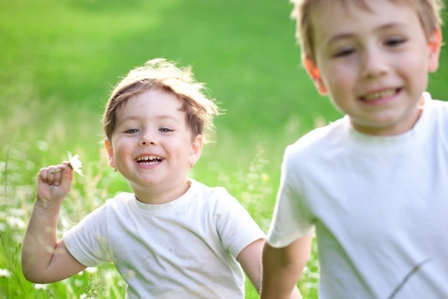
Jessica was downstairs with the children, ages 11 months and 2.5, when she heard an alarm go off upstairs once, then twice. She called 9-11 and police came and apprehended an intruder. Avery accidentally locked herself outside while the boys 2 and 4 were inside. She contacted the Grandma who lived nearby, who had a spare key. Kelly, one of our star nannies, noticed a man in the playground who didn’t seem to belong to the group and she called 911. The man was picked up, a registered child molester.
We don’t normally get tornadoes, hurricanes or flash floods in Phoenix but we have had dust storms, power outages and Arizona does have some slight earthquakes. You buy fire insurance and auto insurance, but have you discussed emergency situations with your nanny before they occur? What are your directives in the following situations: a stranger knocking at the door, power outage, car accident, flat tire, running out of gas, the alarm going off, a runaway pet or a child needing stitches?
Here are a some tips to insure your priorities are followed.
1. At your next monthly meeting, outline some possible scenarios and steps of action with your nanny
2. Consider getting CPR training yourself. When your nanny’s expires may be a great time to go together or simply review a youtube video.
3. Post a fire evacuation map with 2 ways to exit and a safe meeting spot outside the house. Nanny can practice Stop! Drop! Roll! with the children and crawling through the house in case of smoke.
4. Pool Safety. Fence the pool. No running around the pool. No children allowed outside without an adult.
Community Emergency. Carla, one of our veteran nannies, takes community preparedness classes and tells us the most important consideration is water. Electricity is what pumps the water when the generators go out, so on a long extended power outage there will be no water to flush the toilets, wash, cook or drink. We do have loss of power in Arizona occasionally. Think through all the scenarios if you have an extended outage. Don Sherman, a local Gilbert resident has free readiness workshops regularly. Check out his website, www.iwillprepare.com. Carla takes his workshops and is prepared to eat out of the refrigerator and then start canning what’s in her freezer.
Here’s what’s most important:
1. Water. Have a gallon of water per day per person for a period of two weeks. Have 5 gallon jugs stored.
2. Light. What will you do if the electricity goes out for an extended period of time? Do you have candles, and a way to light them? Candles can be set in a sink and burn safely. If you store batteries, recycle them periodically. Candles also bring a sense of warmth and comfort.
3. Food. Have canned food in the house that everyone will eat, like tuna, canned fruit, and cold cereal that the children will eat without milk.
4. Comfort food. Protein bars, hard candy (chocolate melts).
5. Fuel. A way to cook your food and a barbecue grill. Restaurants won’t have electricity and stores may be out of supplies and electricity. Their registers won’t run. Have an extra propane tank or charcoal-plus extra to boil water. Carla has almost 300# in her garage. You can get it on sale during holidays like 4th of July.
6. Fires. What will you do if the firefighter comes to your door and says “Get out! Your neighbor’s house is on fire.” Have a 72 hour kit, for food, medications, water, change of clothes, small first aid kit, a copy of important and irreplaceable documents and a current photo of you and everyone in the family in a ziplock bag.
This weekend, we’re conducting our Nanny Boot Camp covering the following topics. If your nanny hasn’t attended this 4 hour training session encourage her to get signed up. We have a few spaces left. Here’s the link
Curriculum Planning & Scheduling
Child Development-Ages & Stages
Discipline & Building Self-esteem in Children
Physical Care & Safety
Nanny/Family Relationships
Professionalism: Ethics, Respect, and Responsibility
Situational Role Playing
Domestic Duties
Beth Weise


